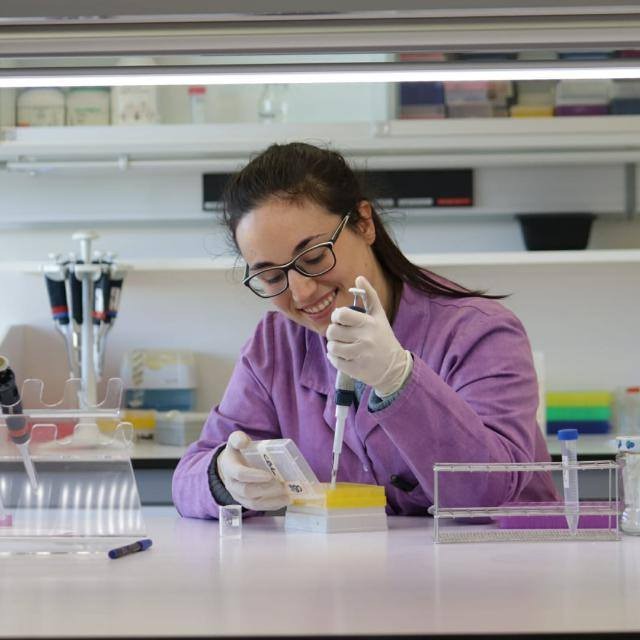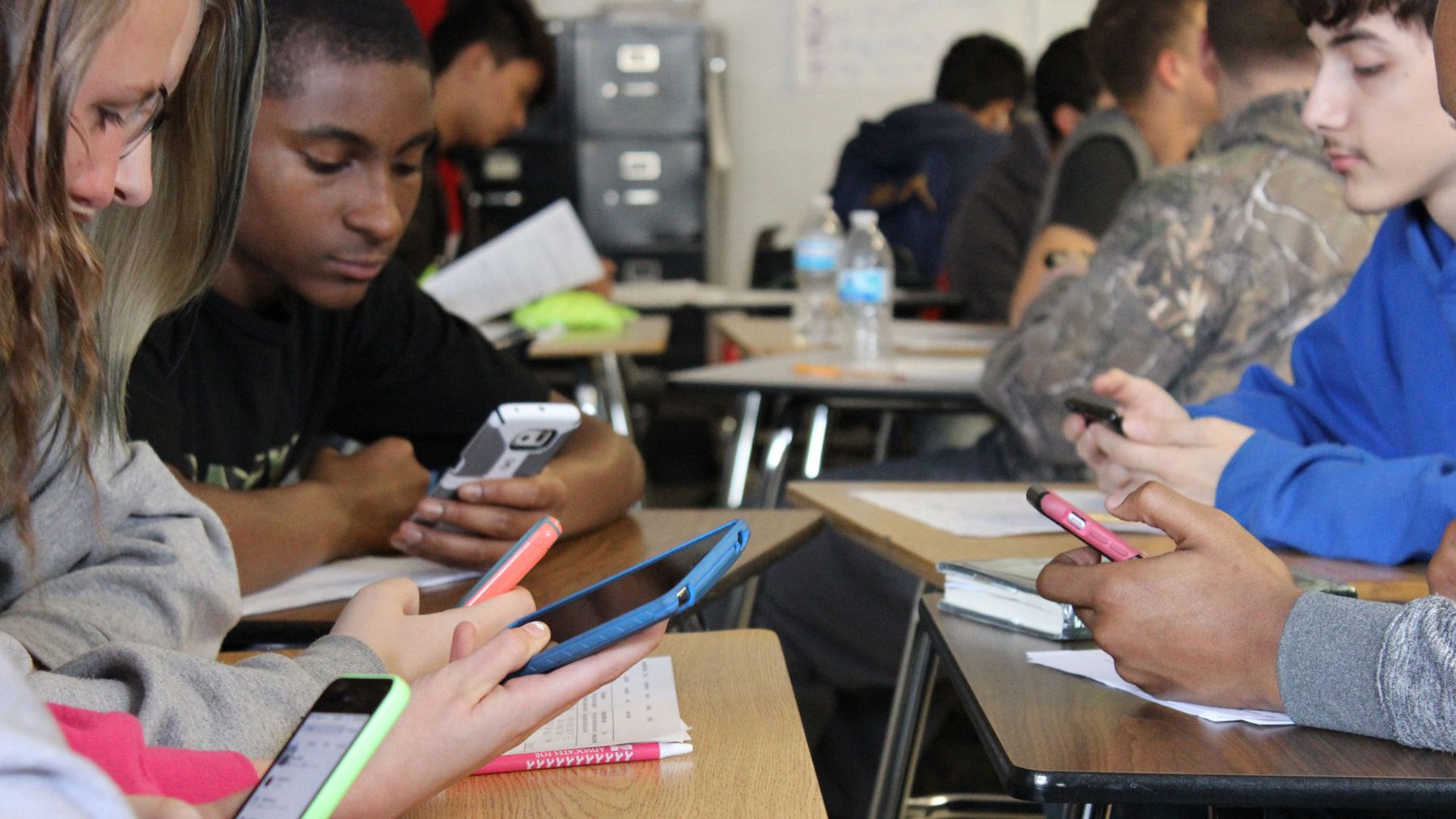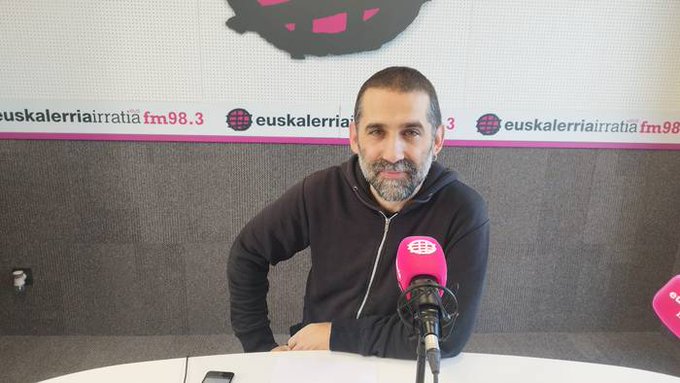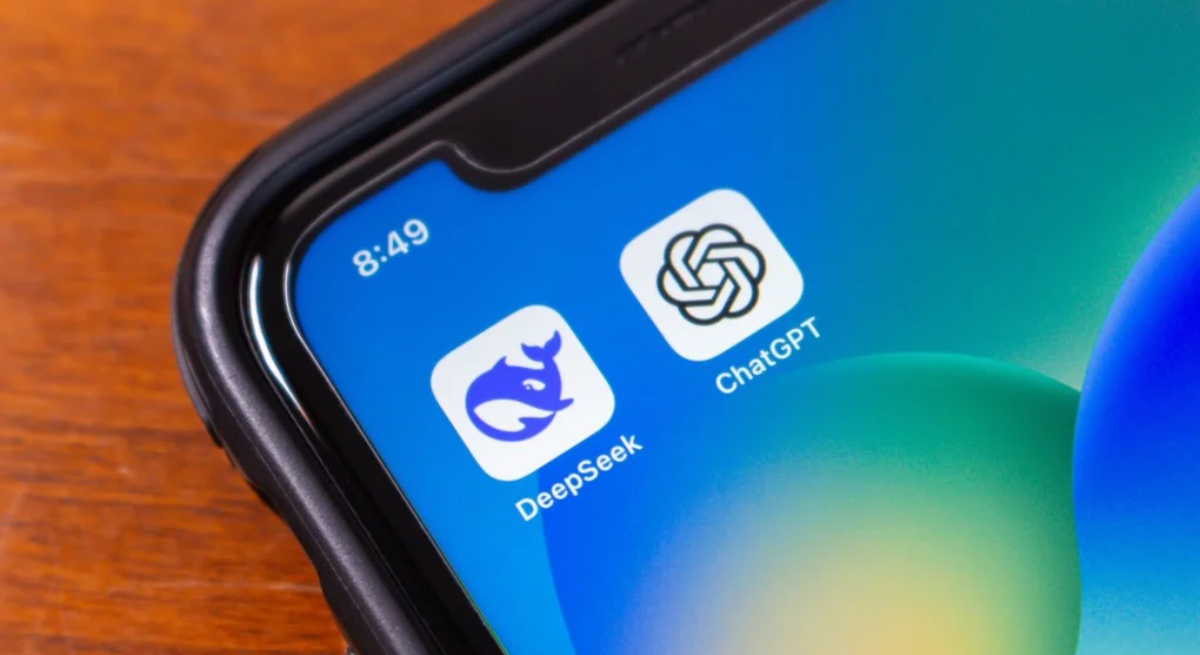"A lot of money gets into science, but researchers are in a precarious situation."
- Arantza Muguruza (Llodio, 1994) investigates in an UPV/EHU laboratory the potassium channels that contain neurons, a type of protein. Meanwhile, he's also doing a PhD. He started working very young in the lab, being in the first course of the career. For the future, he will work in the laboratory for at least three years, until the end of the PhD. However, he wanted to denounce the precarious situation in which today’s researchers find themselves.

What did you learn and why did you start researching this?
I studied biotechnology and later made a master's degree in molecular biology and biomedicine at the UPV/EHU. I started in this lab as an inner student, being in the first, very early.
I've always liked science, I wasn't clear about what the PhD was, but I was clear that I wanted to do research. Then I was very lucky in the first year; in the internships I met a girl: That girl was with my current boss doing the thesis and she saw me interested. He was very young and I asked him what position he had.
In the practices there is a professor and an assistant, usually the people who are doing the thesis are the collaborators. I didn't know that in the foreground. I asked him and he told me he was doing the thesis, and, asking me questions, he finally told me to go through the lab.
I started going through the first, second and third years, but very little. I would go twice a week, three hours or less.
It's not that little.
No, but for me it was an advantage in itself. I was studying a lot in that lab. The things you're going through in college, I was really good at it.
It's an advantage, and it's not finished the race. In the fourth year I went to Erasmus to Italy, to Pavia, where I did the Final Degree Work on another subject, on in vitro fertilization. I chose it because I liked this topic, I wanted to learn more about it.
Human in vitro fertilization?
No, no. At the research level. We work with rats. I was very happy with this lab, with the people, with the research... When I was finished, I saw, however, that I was content with this science.
Maybe I'd like to know more about scientific outreach, but I didn't want to do more research on this topic. I decided to go back to the previous lab, if I was left, of course.
Why? This channel has always fascinated me. I don't know how to say that. It was very curious and we didn't understand it very well. Well, we still don't understand it very well, so we're doing research.
That curiosity woke me up and I decided to go back to this lab with the previous contacts. I also decided to do the master's degree and I saw that I liked it a lot in the master's and that I wanted to do the thesis. The truth is, I wanted to do my thesis with the master's degree.
"We work a lot of hours, but the wage is very low."
What exactly attracts you from this research?
The regulation of this protein is very complex. I want to know how this regulation is done inside a cell. We know a lot about this protein, but not all the puzzle is made up.
Finally, our regulatory channel is flexible, inside cells molecules are flexible. So we get to talk about the dynamics, about how things move. What attracts me most is understanding how they move through regulation.
What exactly is this research and what is it for?
What we have to be clear about is that this is a basic research. It's also very important, because without basic research, you can't get anything else.
We investigate a protein, a potassium channel. The cells send things from the membrane into and out (the membrane is the skin surrounding the cells), but to do so they need help and there are many types of help. One of these types of aid is the channels.
There are several types of channels. For example, there are ion channels that allow ion to pass through the sides, but they don't need the cell's energy, because the ions are headed towards the chemical gradient.
I mean, in the case of potassium, for example, there's more potassium inside the cell than outside. If you leave a tunnel similar to a tunnel, and open it, potassium will go from the inside of the cell to the outside trying to match this chemical gradient. To put it simply, these channels do nothing but open or open the tunnel. So when you open up, potassium moves outward, and when you close, potassium stays inside.
The channel we're researching is the one that's most represented in the brain, in neurons. We've always heard that neurons work through electricity, right?
Electricity is generated in ion movement due to its positive and negative load. When you move these loads, you produce a kind of electricity. When there's an excitation in neurons, sodium is introduced.
Sodium is positively charged. Due to the entry of many positive charges, the neuron is excited and sends this message. The potassium channel opens at that time, right after excitation, and removes other positive loads (potassium atoms). So, a lot of sodium atoms have been introduced. The neuron is positively charged, but opens the potassium channel to return to its baseline state and removes potassium. In short, the potassium channel controls cellular excitation, that is, it calms neurons.
"Institutions that give money don't understand how science works."
There's a lot of potassium channels; it's an amazing world. I don't mean concrete numbers, but there are hundreds. Ours enters a family where there are five types of channels and the five are very similar.
The biggest difference is that they are expressed in different tissues. We, in fact, want to know how exactly the potassium channel of neurons works to know how this excitation control of neurons works.
Through this control, we can also know how a responsible person who calms his heart works. There are many of them. Another potassium channel is indicated in the ear, another three in the brain, etc. So what's our idea? Know how to operate in order to have such information and to be able to solve your problems.
We also investigated mutations to learn how mutations worsen the proper functioning of the potassium channel. And what do those mutations do? In our case, in the case of neurons, they have been related to epilepsy, mostly in infantile epilepsy, with epilepsy being very hard. Sometimes they can cause death. I
They're also very strong, because they occur in young children and they get to have a hundred seizures a day.
For example, there are some called BNFS: In children there are a lot of cases of epilepsy, but growing up, there may be no more. It's been seen that seizures spend between six and nine years, but then they have cognitive problems. And there are other cases that cause death, that have childhood epilepsy and that die at age six. It happened to David Cameron's child.

When did the research begin and when do you expect it to end?
It's hard to say, my master has spent his whole life researching this. For me, in theory, this research will end when the thesis ends.
In fact, I started before the master's degree. Well, the truth is, no. I had to do a fifth year because I lacked two subjects. That year, I started to do a little project slowly.
Finally, I have at least three years left. Once the thesis is finished, I don't know what will happen.
How many years have passed for the time being?
One performing the thesis, another with the master's degree and another with this fifth course. Three years in total, but it's not the same to be all day in the lab, to have the middle classes and go only when you can. When you have tests you can't go, it's not the same. In fact, I've been doing research for a year.
How do you think this research can be used in the short, medium and long term?
In the long term, it can facilitate the design of these patients' drugs. The journey is very long, from the moment you start designing a drug to the market, you have to go through several phases of study.
They have to go through complete clinical investigations. It usually takes an average of 15 years from the time the drug is investigated until it is marketed. In addition, many of them do not work and cannot be marketed. It's a long-term thing.
Here's a problem. On the one hand, they don't give much money for basic research, they always invest in applied research. Institutions that give money don't understand how science works.
For me, it's very simple, if it doesn't work in basic research, it won't work in applied research, because you have to work on basic concepts. But in the end, we all want to get the drugs out, it's much more attractive. It's much easier to sell your project.
Another problem is that, in the end, this type of epilepsy is a relatively rare disease. It's not like cancer, it's not like heart attacks. The ones that appeared in our potassium channel have also been linked to autism.
Of course, we have to think that that's just a small part of our brain, but if we understand it, we'll have another part in the puzzle to understand our brain. What for? Understand our diseases and the functioning of our brain.
And it's not just that. Fixing things in basic science helps you do other things in the long run.
For example, I recently attended a talk delivered by a woman from Donostia who designed biotools and protein biosensors based on their shapes. This can't be done if you don't know how proteins work. The study of a protein, from an atomic and dynamic point of view, provides you with information for the elaboration of this type of tools.
"Potassium channels are very rare, we still don't understand them very well."
I do not know if you would like to add anything.
Yes, I'd like to talk about the precariousness of science. It's a bypass. I could report cases and cases, and that which I am not bad at. The salary itself is not bad, I have a scholarship from the Basque Government, but it is a little precarious.
We have now been paid up to the value of our statute. The Statute came out in March of this year and so far we have not been given that increase.
It's a very difficult world. If you have to do twelve or more hours, you'll do them, and it doesn't matter if nobody pays you. You are in research and will not leave an experiment in the center if you are researching something very important to you.
Plus, it's your research. I'm also doing a thesis and I have to do it, that's training. I do not know how I would do it, but it is clear that we have to change.
We work a lot of hours, the salary is very low, there are very few subsidies... They're now promoting bringing out people who have left here.
That's OK, but if you bring older people and you don't bring the workers who are in the lab, what are you going to do? You can't do anything.
I think they have to put more support and rethink the issue of precariousness, but that is the case in all cases. The people who are doctors are worse than us. I know a lot of cases that are part-time but working eight, ten or twelve hours. That is very difficult.
Although they say they drive science, it's not true. It is true that there is a lot of money, they have to pay for infrastructure... But people are in a precarious situation. Are buildings created and machines purchased, and how are their employees? You have to think that we are people.
This weekend I've been thinking about the word 'aesthetic' in relation to a phrase said by a friend: “This work is aesthetic.” I have studied the etymology of the word aesthetic, it seems that its meaning was originally perceived through the senses, and it was later associated... [+]
Life surrounds everything, it is limited and fragile. To live good lives, it seems to me that the body knows what to do, while the mind, although it knows (when it is well informed), often sees the body deliberately silence. In this silence the mind opens itself to relations... [+]
The consumerist culture we live in sends every user to an unreasonable enjoyment. As Slavoj Zize says, Enjoy your fetish, it has become the rude mandate of hypermodernity. Current enjoyment is carried out through existing technological devices to occupy the place of fetish. But... [+]





















